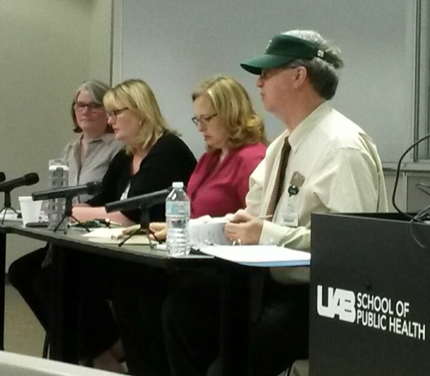 What does it take to move an NIH R01 grant through submission and resubmission to finally achieve the coveted “NOGA” (Notice of Grant Award)? More than 60 attendees gathered at our annual Mock NIH Study Section Review last week to find out. A real-world R01 grant that initially received a non-fundable impact score of 42, which improved to a fundable score of 25 after the investigator worked with CCTS, served as the focus of the review.
What does it take to move an NIH R01 grant through submission and resubmission to finally achieve the coveted “NOGA” (Notice of Grant Award)? More than 60 attendees gathered at our annual Mock NIH Study Section Review last week to find out. A real-world R01 grant that initially received a non-fundable impact score of 42, which improved to a fundable score of 25 after the investigator worked with CCTS, served as the focus of the review.
As defined by the NIH, “the Research Project Grant (R01) is an award made to support a discrete, specified, circumscribed project to be performed by the named investigator in an area representing the investigator’s specific interest and competencies, based on the mission of the NIH.”
CCTS Training Academy Director Dr. David Chaplin provided an overview of an NIH study section’s goals and processes and alternated between serving as study section chair and the Scientific Review Officer (SRO) (he wore a green visor to indicate when he was “in role” as SRO). The other panelists, including Dr. Karen Cropsey, associate professor, psychiatry and behavioral neurobiology, Dr. Jennifer Polluck, professor, medicine/nephrology, and Dr. Shannon Bailey, professor, molecular and cellular pathology, took turns acting as primary and secondary reviewers.
Attendees learned about the different sections of an R01 grant and how they are scored for scientific and technical merit. Panelists explained their mock scores regarding the overall impact grant and its strengths and weaknesses for review criteria, including significance, investigators, innovation, approach, and environment. They also discussed important considerations for human subject protections; inclusion of women, minorities, and children; animal welfare and biohazards (if applicable); resource sharing plans; and budget. The panelists also described the need to address NIH’s rigor, reproducibility, and transparency requirements, which apply to nearly all NIH grant applications, not just the R series.
Panelists stepped out of their roles to address several areas that can weaken an R01 grant: whether the number of subjects chosen is high enough to produce meaningful results and support a well-conceived power calculation; not providing a clear description of appropriate statistical analyses that will be performed; and failing to thoroughly address human subjects protection. Dr. Chaplin encouraged attendees to reach out to the CCTS for help in appropriately addressing these areas, noting R01 applicants who do so "greatly strengthen their grants and increase their chance of funding as much as three times the NIH baseline."
CCTS is grateful to its cohosts, the UAB Minority Health and Health Disparities Research Center and UAB Center for Outcomes and Effectiveness Research and Education. We also wish to thank our panelists and Dr. Adam Wende, assistant professor, UAB Dept. of Pathology, whose R01 grant, "Glucose-Mediated Remodeling of Cardiac DNA Methylation," served as the before and after model in the mock review. Dr. Wende is a 2016 CCTS Pilot awardee. For those who missed this event, a video is available on the CCTS YouTube channel.
The Mock NIH Study Section Review traditionally marks the end of our Clinical and Translational Science Training Program (CTSTP). From Jan. to June, our 2017 CTSTP trainees received more than 50 hours of didactic instruction in research project development, ethics, clinical trials, epidemiology, biostatistics. They gained exposure to many types of clinical and translational research, including health services, genomics/informatics, behavioral, and community-based participatory research. The Mock NIH Study Section Review is a highlight for many trainees, especially those who plan to pursue a career in research.
Interested in becoming a CTSTP trainee? Email your interest and/or questions to